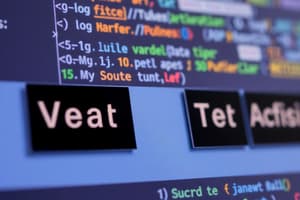Podcast
Questions and Answers
What are the rules for naming variables in C?
What are the rules for naming variables in C?
Variable names must begin with a letter or underscore, cannot contain spaces, and cannot match reserved keywords.
How would you declare an integer variable named varInt and assign it the initial value of 10 in C?
How would you declare an integer variable named varInt and assign it the initial value of 10 in C?
int varInt = 10;
Explain how you can update the value of the varInt variable to 20 after it has been declared and initialized.
Explain how you can update the value of the varInt variable to 20 after it has been declared and initialized.
varInt = 20;
What is the data type of the variable varFloat in the given code snippet?
What is the data type of the variable varFloat in the given code snippet?
How would you declare a character variable named varChar and assign it the value 'C' in C?
How would you declare a character variable named varChar and assign it the value 'C' in C?
Why is understanding variables in C important for software development?
Why is understanding variables in C important for software development?
What are variables in programming?
What are variables in programming?
Name two types of integer variables in C.
Name two types of integer variables in C.
What do floating-point variables in C store?
What do floating-point variables in C store?
What is the default data type for variables without explicit declaration in C?
What is the default data type for variables without explicit declaration in C?
What type of data do character variables in C represent?
What type of data do character variables in C represent?
What are string literals in C?
What are string literals in C?
Flashcards are hidden until you start studying
Study Notes
C Programming: Understanding Variables
Overview of C Programming
C is a high-level programming language that combines the power of low-level memory management with a wide array of features suitable for various applications. Developed by Dennis Ritchie in 1972 and currently managed by the ANSI, C has become a cornerstone of modern software development due to its efficiency and flexibility.
Understanding Variables in C
Variables are essential components of every programming language, serving as storage containers for storing and manipulating data during runtime. In C, variables play a crucial role in implementing algorithms and processing information. There are different types of variables in C, each designed to handle specific types of data:
Integer Variables
Integer variables store whole numbers, such as integers and characters. Some common integer data types in C include int, short, long, and char. The default data type for variables without explicit declaration is int.
Floating-Point Variables
Floating-point variables are used to store decimal numbers with fractional parts. C provides two types of floating-point data types: float for single precision and double for double precision.
Character Variables
Character variables represent individual characters using the char data type. They can hold values from the range of standard ASCII characters. C also supports string literals, which are arrays of characters enclosed within double quotes.
Declaring Variables in C
To declare a variable in C, you must specify its name, data type, and optionally provide an initial value. Variable names in C follow specific rules: they must begin with a letter or underscore (_), cannot contain spaces, and cannot match any reserved keywords. Here's an example of declaring different types of variables:
int varInt = 10;
float varFloat = 3.14;
char varChar = 'C';
In this code snippet, we have declared three variables: varInt, varFloat, and varChar. The first one, varInt, represents an integer variable initialized to 10. Similarly, varFloat is a floating-point variable assigned the value 3.14, while varChar holds the character 'C'.
Accessing and Modifying Variables
Once declared, you can access and modify variables by referring to their respective names. For instance, to assign a new value to the varInt variable, you would use the following syntax:
varInt = 20;
This line of code updates the value of varInt to 20. You can perform similar operations on other variables as well, such as incrementing or decrementing their values.
Conclusion
Understanding variables in C programming is crucial for developing efficient software applications. By grasping how to declare, initialize, access, and manipulate variables, you will unlock the full potential of this powerful language. With the foundation provided here, you will be able to build complex programs that effectively solve real-world problems.
Studying That Suits You
Use AI to generate personalized quizzes and flashcards to suit your learning preferences.




